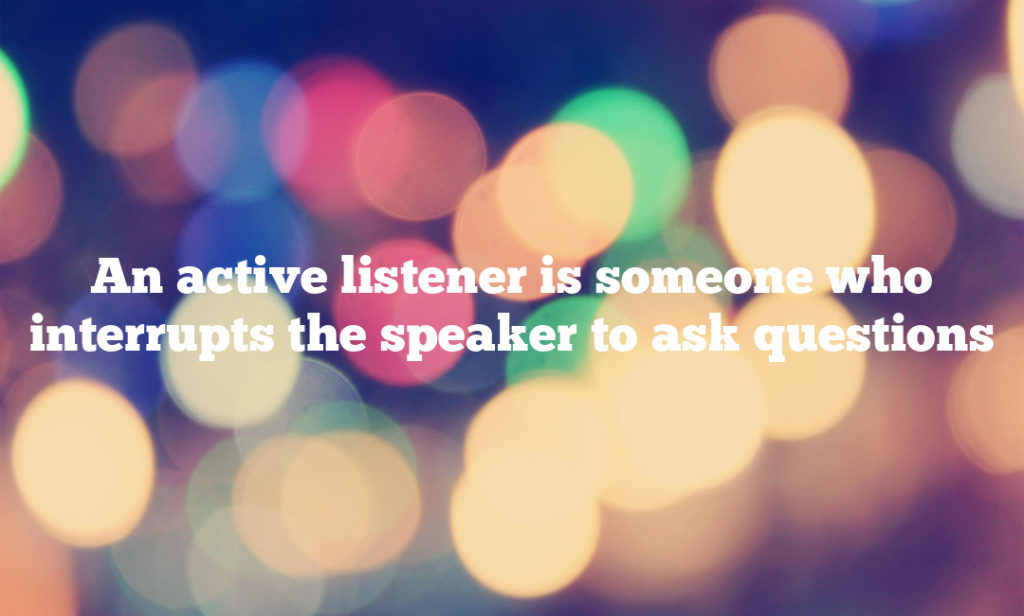An active listener is someone who interrupts the speaker to ask questions
In a world buzzing with constant information and rapid-fire conversations, the ability to actively listen has never been more crucial. Active listening, a skill that goes beyond mere hearing, involves understanding, empathizing, and engaging with the speaker on a profound level. While silence often characterizes listening, it’s the questions asked that can truly amplify this skill. Curiosity, in particular, serves as a powerful catalyst, fueling the need to ask questions and uncover the depth of the speaker’s thoughts and feelings.
Table of Contents
Toggle
Active Listening: The Core of Meaningful Communication
Before we delve into the role of curiosity and questions, it’s essential to revisit the significance of active listening in our lives.
Building Bridges of Connection
Active listening forms the foundation of meaningful connections and relationships. By paying close attention and responding thoughtfully, you demonstrate respect for the speaker’s perspective, fostering trust and rapport.
Enhancing Problem-Solving and Decision-Making
In professional and personal contexts, active listening plays a pivotal role in problem-solving and decision-making. When you truly understand a situation or issue, you are better equipped to make informed choices and contribute to effective solutions.
Mitigating Misunderstandings
Miscommunication often arises from a lack of active listening. By engaging fully in a conversation, seeking clarification when necessary, and asking questions, you can significantly reduce misunderstandings and the conflicts that may follow.
Cultivating Empathy
Active listening requires immersing yourself in the speaker’s world, understanding their emotions, and acknowledging their experiences. This not only enhances your understanding but also strengthens empathy, a key quality for nurturing healthy relationships.
Curiosity: The Fuel for Active Listening
Curiosity is the spark that ignites active listening. It’s the driving force that compels you to ask questions and seek deeper understanding. Here’s how curiosity plays a pivotal role in enhancing your active listening skills:
1. Igniting Interest
Curiosity naturally piques your interest in what the speaker is saying. It’s the sensation that makes you lean in, listen attentively, and want to know more. When you’re genuinely curious, your questions are not mere formalities; they stem from a sincere desire to learn.
2. Fostering Engagement
Curiosity keeps you engaged in the conversation. It prevents your mind from wandering or tuning out. When you’re genuinely curious, you’re mentally present, absorbing the speaker’s words and nuances.
3. Seeking Deeper Insights
A curious mind is inherently inquisitive. It doesn’t settle for surface-level information. Instead, it craves deeper insights and understanding. This drives you to ask questions that dig beneath the superficial layers of a conversation.
4. Demonstrating Respect
When you’re curious, you show respect for the speaker’s knowledge and experiences. Your questions convey that you value their perspective and want to tap into their wisdom.
The Synergy of Curiosity and Questions
Now that we’ve established the significance of curiosity, let’s explore how asking questions can amplify your active listening skills:
1. Encouraging Elaboration
Curiosity-driven questions encourage the speaker to delve deeper into their thoughts and feelings. They signal that you genuinely want to understand their perspective. For instance, instead of saying, “I see,” you might ask, “Can you share more about your experience?”
2. Uncovering Unspoken Emotions
Curiosity prompts you to ask questions that probe beneath the surface. You might inquire about the speaker’s emotions, challenges, or motivations. This can lead to uncovering unspoken feelings and insights that would otherwise remain hidden.
3. Creating Connection
When you’re curious and ask questions that resonate with the speaker, you create a connection. They feel heard, valued, and understood, which fosters trust and empathy in the conversation.
4. Clarifying and Validating
Curiosity also drives you to ask clarifying questions when the speaker’s words are unclear or when you need more context. These questions validate the speaker’s perspective and show that you’re committed to grasping their message accurately.
Mastering the Art of Asking Curious Questions
While curiosity is a potent force, it’s essential to channel it effectively through the art of asking questions. Here are some guidelines to help you become a skilled questioner:
1. Start with Open-Ended Questions
Open-ended questions invite the speaker to share more than a simple “yes” or “no” response. They encourage detailed and meaningful answers. Examples include “How do you feel about…?” or “What are your thoughts on…?”
2. Patience and Active Listening
Effective questioning goes hand in hand with active listening. Be patient and allow the speaker to respond fully before asking your next question. Avoid interrupting or rushing the conversation.
3. Non-Verbal Cues
Your non-verbal cues, such as maintaining eye contact, nodding, and using facial expressions, communicate your engagement and interest in the conversation. They assure the speaker that you are actively listening and respecting their input.
4. Reflect and Formulate
After the speaker answers your question, take a moment to reflect on their response. This demonstrates that you genuinely consider their perspective and allows you to formulate more thoughtful follow-up questions.
Challenges to Overcome
While curiosity and questions are powerful tools for active listening, there are challenges to be aware of:
1. Avoid Leading Questions
Leading questions can bias the speaker’s response. Instead of asking, “Don’t you think that…?” opt for open-ended queries like “What are your thoughts on…?” to foster unbiased and genuine responses.
2. Balance Questioning and Listening
Strive for a balanced conversation where you actively listen, use non-verbal cues, and ask questions. Avoid dominating the conversation with an excessive number of inquiries.
3. Steer Clear of Judgmental Queries
Questions that come across as judgmental or confrontational can hinder communication. Aim for questions that promote understanding and empathy rather than defensiveness.
4. Refrain from Interruptions
Respect the flow of the conversation by refraining from interrupting the speaker. Allow them to finish their thoughts before asking your next question.
Conclusion
Curiosity is the driving force behind effective active listening. It ignites your interest, fosters engagement, seeks deeper insights, and demonstrates respect for the speaker’s perspective. When coupled with thoughtful questions, curiosity becomes a dynamic tool for amplifying the power of active listening.
Incorporating the synergy of curiosity and questions into your active listening skills is not just a skill; it’s a transformational practice. By embracing curiosity and asking questions with sincerity and respect, you not only deepen your understanding of others but also nurture profound connections and more meaningful relationships in every facet of your life. So, the next time you find yourself in a conversation, harness the power of curiosity, and let your questions be the conduit to a deeper, more enriching dialogue.




